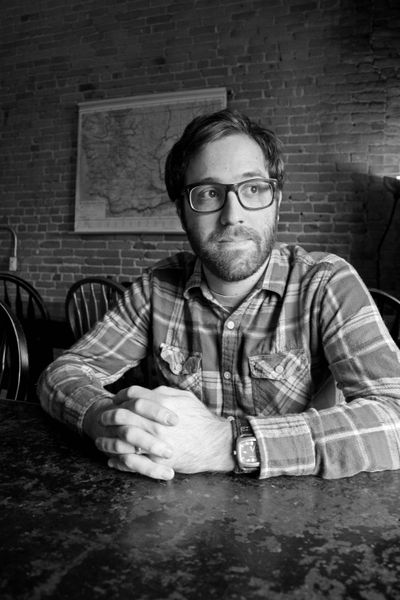Memoir captures friendship in snapshots

Like a collection of pre-Instagram photos with no filters to blur the hard edges, “Learn to Swim” (University of Hell Press, 2015) offers an unsentimental yet moving snapshot of a 10-year friendship.
Author Joseph Haeger, 29, wrote the novella-length memoir while finishing up his English degree with an emphasis on creative writing at Eastern Washington University. The catalyst was the death Ryan Emery, Haeger’s best friend since sixth grade.
In the early morning hours of Thanksgiving 2007, Emery was pulled over in north Spokane for driving under the influence. As the Washington State trooper prepared to cuff him, Emery punched him and took off in his car. The trooper pursued. A short time later Emery lost control and went over an embankment. He died on impact. He was 20 years old.
“When he died that’s all I could think about for the next three months,” Haeger said. “I was terrified I’d forget things about our friendship. I jotted down every memory as it came to me.”
We were both on the line between lightweight and heavyweight.
At first, we thought we would do better on the bigger football team so we drank protein shake after protein shake. We were trying to gain five pounds.
His Dad came in and asked why we wanted to be the small guys on the team. We hadn’t thought about it that way.
So we spent three days running around our neighborhood trying to lose five pounds.
“We all experience growing up and friendship is universal,” Haeger said. “I wanted people to connect to it.”
The Mead High School graduates connected when they played on the same soccer team. “Learn to Swim” chronicles their relationship in short vignettes, capturing mundane moments and heartbreaking milestones with sparse prose.
He would sit next to me with red eyes while I read a book.
He told me later that he always thought I knew he was stoned.
I never actually did.
The book doesn’t follow a traditional format. No names are used and Haeger toys with time, flashing forward or backward often in the same section.
“Each moment is a photo and through those you build a bigger collage of what our friendship was,” he said.
The watershed moment in the book and in Haeger’s life occurs when his brother, Justin, 22, dies from a drug overdose. Haeger was 19 at the time.
“It had a huge impact on me – on my life – how I viewed everything. Justin dying altered my reality. My brother and I didn’t have a great relationship, though at the time of his death it was improving.”
And during that chaotic time of grief and loss Emery was there for him.
He hugged me harder than anyone ever had.
Like most friendships theirs ebbed and flowed. Sometimes weeks would pass without them seeing each other, but Haeger said the minute they spoke or saw each other it was as if no time had passed.
The night before Emery died he called him and left a message.
“Joe, Joe, Joe, call me back.”
Haeger returned his call and invited him to go to a movie with him. Emery declined.
See a crack in the cement. Smell a certain scent. Hear a certain note. A certain style. Memories will come raining.
With each drop a vivid picture will pop into the head. A smile. A sob. A moment.
I feel every drop sting.
Haeger called the process of writing “Learn to Swim” therapeutic, but never intended the book to be a tribute to his friend – instead he wanted it to be an ode to friendship.
“I didn’t want to glorify or glamorize Ryan. I just wanted people to know who he was,” he said.
Currently, he is combining writing with being an at-home dad. He and his wife, Maureen, are the parents of Abe, 2 1/2.
“Since I had a kid, my writing has changed from meditations on death to meditations on parenting,” he said. Then he laughed. “Both equally terrifying.”
We swam out to the nearest buoy.
It didn’t look to be that much of a swim. We were wrong.
Fire burned my lungs. I held on to the floating object afraid of the future. Neither one of us wanted to swim back.
I was still trying to catch my breath when he said he was going back to shore.
“Wait for me,” I said.
But he had already started swimming.
In talking about the title, Haeger said, “When you hit that watershed moment, that’s when the flood starts. You’re either going to drown or learn to swim.”
When asked if he’s learned to swim, he paused.
“I don’t know if I have at this point. Grief doesn’t go away. It’s a part of you. Maybe I’m still holding on to the buoy with both hands.”